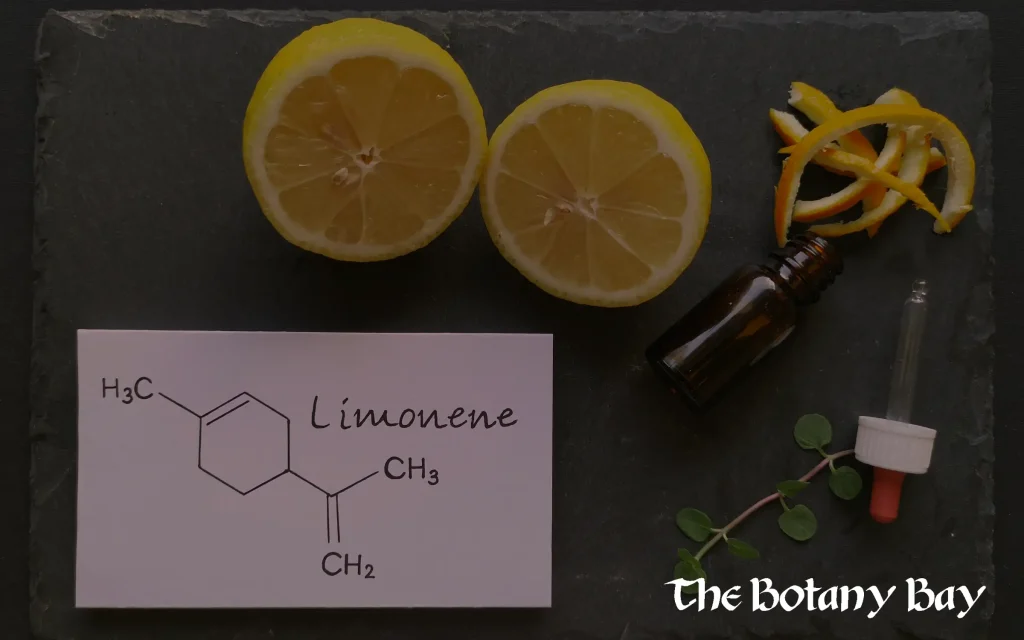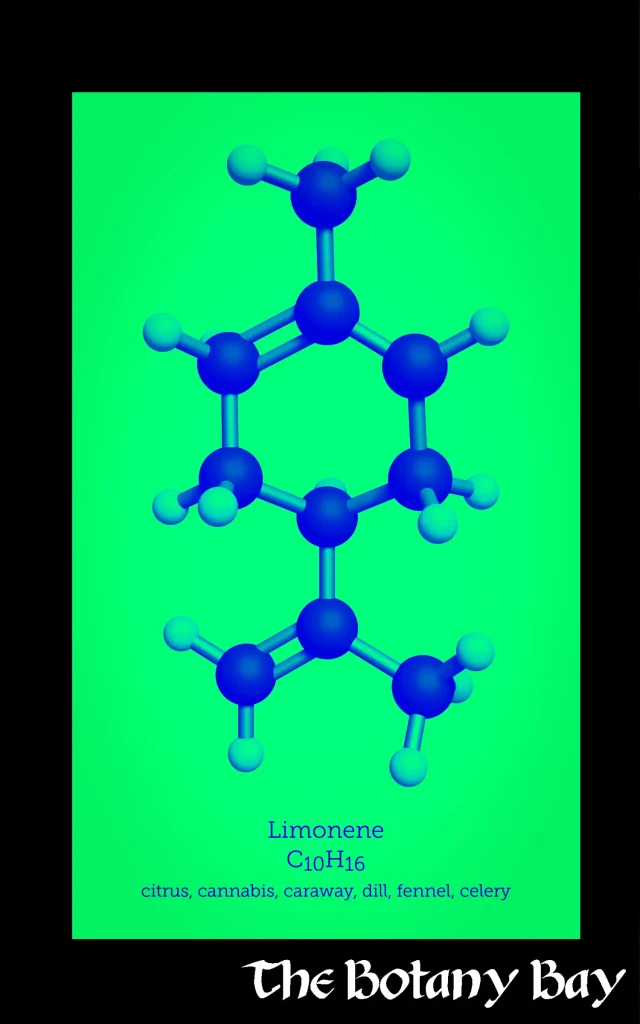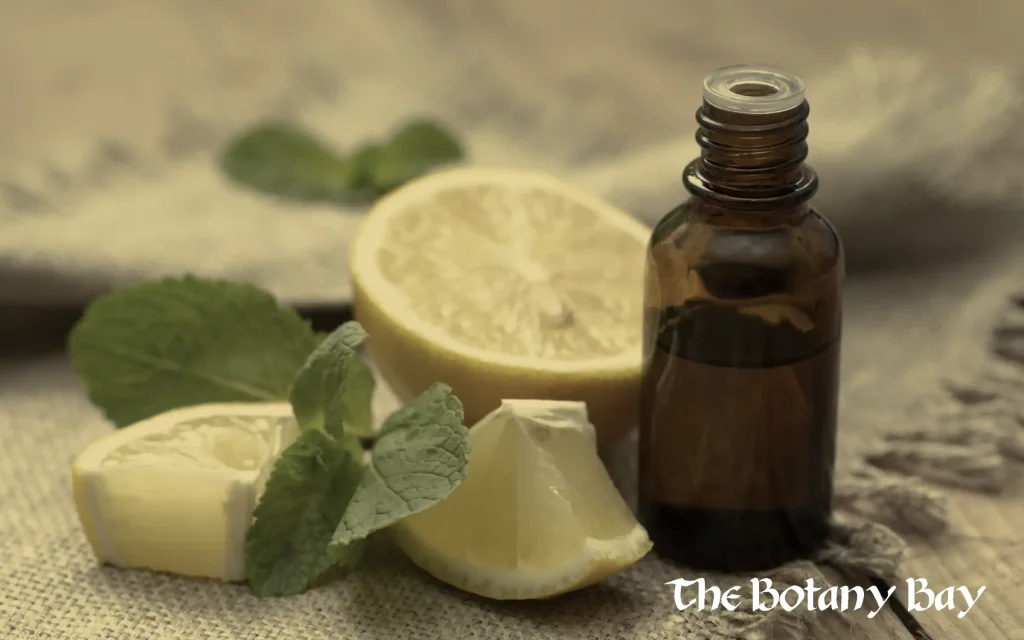Understanding Limonene
Your Comprehensive Guide to Limonene
At The Botany Bay, we believe in empowering you with knowledge about the aromatic compounds found in hemp and cannabis. Limonene is one of the most abundant terpenes in cannabis and is also found widely in nature. Recognized by its fresh, citrusy aroma, limonene is valued for its fragrance, flavor, and potential role in the plant’s natural defense system.

What Is Limonene?
Limonene is a monoterpene — a type of aromatic hydrocarbon produced in the resin glands of cannabis and in the rinds of citrus fruits. It is responsible for the bright, zesty scent found in lemons, oranges, limes, and many cannabis strains.
There are two main forms:
D-limonene — Common in citrus peels, with a strong lemon-orange aroma
L-limonene — Found in pine and fir needles, with a more resinous scent
In cannabis, limonene can appear alone or in combination with other terpenes, contributing to a variety of aromas and flavors.
How Limonene Works in the Body
Limonene is inhaled when you smell cannabis or citrus fruits and ingested when consumed in foods or products. In the body, it’s absorbed into the bloodstream and metabolized mainly in the liver. While its exact interactions are still being studied, research suggests:
Olfactory pathway — Limonene’s scent molecules bind to receptors in the nose, sending signals to the brain’s limbic system, which is involved in mood and emotion.
Potential receptor activity — Early studies indicate limonene may influence certain neurotransmitter systems indirectly, but it does not bind strongly to CB1 or CB2 cannabinoid receptors.
The entourage effect — When combined with cannabinoids and other terpenes, limonene may contribute to the overall sensory and experiential profile of cannabis.
These findings are preliminary, and effects may vary between individuals.

Natural Sources of Limonene
Limonene is one of the most abundant terpenes in nature. You can find it in:
Citrus fruit peels (lemons, limes, oranges, grapefruits)
Juniper berries
Peppermint
Rosemary
Dill
Pine needles
Bergamot
Caraway seeds
Its concentration is highest in citrus rinds, which is where most commercially used limonene is sourced.
Not Just In Cannabis
Common in the natural world. Flip to learn more.
Limonene is abundant in lemon, lime, and orange rinds, rosemary, peppermint, and juniper, making it one of the most widespread terpenes in plants.
Purity in Industry
From nature to products – flip the box for more info.
D-limonene from citrus peels is used in foods, fragrances, cleaners, and cosmetics for its fresh scent and solvent properties.
Legal Status of Limonene
Limonene is not a controlled substance. It is naturally occurring in many plants and is Generally Recognized as Safe (GRAS) by the U.S. Food and Drug Administration for use in food and cosmetics. In cannabis, its legality follows the laws that apply to the plant’s cannabinoid content.

Reported Effects and Benefits of Limonene
While limonene itself is not intoxicating, it is often reported by consumers to contribute to the overall character of cannabis products. These reports are anecdotal and can vary widely between individuals.
People have described limonene-rich products as:
Having a bright, uplifting aroma that feels energizing or mood-lifting
Offering a fresh, clean scent that enhances the sensory experience
Pairing well with other terpenes to create citrus-forward flavor profiles
In cannabis, limonene is thought to play a role in the entourage effect, potentially influencing how cannabinoids and other terpenes are perceived together.
These reported effects are based on user experiences and early research. They are not guaranteed, and results can vary from person to person.
How to Experience Limonene
Limonene is found in many cannabis products:
Flower — Naturally occurring in certain strains
Concentrates — Retained in terpene-rich extractions
Terpene-infused products — Such as vape cartridges, edibles, and tinctures formulated for specific aroma profiles
Testing and Transparency
At The Botany Bay, we only carry products that are:
Third-party lab tested for cannabinoid and terpene content
Screened for pesticides, heavy metals, and residual solvents
Labeled with terpene profiles when available
Compliance Disclaimer
This content is for educational purposes only and has not been evaluated by the Food and Drug Administration. Limonene in cannabis products is not intended to diagnose, treat, cure, or prevent any disease. Always consult a healthcare provider before using any new wellness product.
FAQs About α-Humulene
Is limonene psychoactive?
Does limonene always smell like lemon?
Which cannabis strains have limonene?
Can I get limonene from food?
NEWSLETTER
Sign up to our newsletter to keep updated with our latest offers and products.
© 2025 The Botany Bay All Rights Reserved
Disclaimer:
Some products sold by The Botany Bay are not scheduled under U.S. federal law but may be subject to state or local restrictions. The Botany Bay conducts due diligence and restricts orders to jurisdictions where these products are legal. Orders placed to prohibited areas will not be fulfilled. However, it remains the customer’s responsibility to ensure compliance with any applicable local, state, or international laws before purchasing. These products have not been evaluated by the FDA and are not intended to diagnose, treat, cure, or prevent any disease.
Kratom Disclaimer:
This product is not available for shipment to the following states: Alabama, Arkansas, Indiana, Louisiana, Rhode Island (until April 1, 2026), Vermont, and Wisconsin; or the following localities: Sarasota County (Florida); San Diego, Oceanside, Newport Beach, and unincorporated San Diego County (California); Alton, Jerseyville, Edwardsville, Glen Carbon, and Godfrey (Illinois); Denver, Monument, and Parker (Colorado); and Union, Alcorn, Lowndes, Monroe, and Tishomingo Counties, as well as the cities of Columbus, Oxford, Ridgeland, Corinth, Belmont, and Gluckstadt (Mississippi).
Cannabinoid Disclaimer:
This product is not available for shipment to states that restrict or ban hemp-derived cannabinoids, including Alaska, Arizona, Arkansas, Colorado, Delaware, Hawaii, Idaho, Iowa, Mississippi, Montana, Nevada, New York, North Dakota, Rhode Island, Utah, and Vermont; or to jurisdictions with specific local prohibitions on psychoactive hemp derivatives (e.g., Delta-8, THCA).
Disambiguation Disclaimer: The Botany Bay is not affiliated with Botany Farms.
- 0 Items
- View Cart
